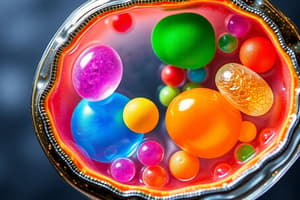Podcast
Questions and Answers
What is the definition of Selective Breeding?
What is the definition of Selective Breeding?
- The application of technological processes on living organisms
- The continued breeding of organisms with different characteristics
- Allowing only those organisms with desired characteristics to breed (correct)
- A cross of two individual organisms
What does Hybridization produce?
What does Hybridization produce?
An offspring with the best characteristics of both organisms
Inbreeding refers to the breeding of organisms with diverse characteristics.
Inbreeding refers to the breeding of organisms with diverse characteristics.
False (B)
What is Biotechnology?
What is Biotechnology?
What does Polymerase Chain Reaction (PCR) do?
What does Polymerase Chain Reaction (PCR) do?
What is Recombinant DNA?
What is Recombinant DNA?
What is a Plasmid?
What is a Plasmid?
What does Transgenic refer to?
What does Transgenic refer to?
What is a Clone?
What is a Clone?
What is Gene Therapy?
What is Gene Therapy?
What is DNA Microarray used for?
What is DNA Microarray used for?
What is DNA Fingerprinting?
What is DNA Fingerprinting?
What does Forensics study?
What does Forensics study?
Flashcards are hidden until you start studying
Study Notes
Selective Breeding
- Selective breeding involves mating organisms with desirable traits to enhance those characteristics in future generations.
Hybridization
- Hybridization creates offspring that inherit beneficial traits from two different parent organisms, aiming for optimal characteristics.
Inbreeding
- Inbreeding refers to the mating of similar organisms, which can amplify certain traits but also increase the risk of genetic disorders.
Biotechnology
- Biotechnology applies technological techniques to manipulate living organisms and biological systems for various applications in fields such as medicine and agriculture.
Polymerase Chain Reaction (PCR)
- PCR is a powerful technique for amplifying specific DNA segments, allowing scientists to obtain numerous copies from a small initial sample.
Recombinant DNA
- Recombinant DNA technology combines genetic material from different sources, enabling researchers to produce organisms with new traits.
Plasmid
- Plasmids are small, circular DNA molecules found in many bacteria, used in biotechnology for gene cloning and manipulation.
Transgenic
- Transgenic organisms possess genes from different species, created through genetic engineering to introduce new traits or improve existing ones.
Clone
- A clone is a genetically identical entity produced from a single parent cell, often used in research and agriculture for replicating desirable traits.
Gene Therapy
- Gene therapy is a medical approach that alters genes to treat or prevent diseases, often replacing faulty genes with functional ones.
DNA Microarray
- DNA microarrays consist of thousands of DNA fragments arranged on a chip, facilitating the measurement of gene expression across many genes simultaneously.
DNA Fingerprinting
- DNA fingerprinting analyzes unique patterns in an individual's DNA, serving as a critical tool for identifying genetic relationships and forensic investigations.
Forensics
- Forensics encompasses the scientific examination of crime scene evidence, applying biological techniques to solve legal cases and establish facts.
Studying That Suits You
Use AI to generate personalized quizzes and flashcards to suit your learning preferences.




